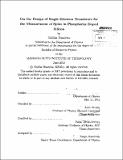On the design of single electron transistors for the measurement of spins in phosphorus doped silicon
Author(s)
Randeria, Mallika
DownloadFull printable version (8.037Mb)
Other Contributors
Massachusetts Institute of Technology. Department of Physics.
Advisor
Amir Yacoby and Pablo Jarillo-Herrero.
Terms of use
Metadata
Show full item recordAbstract
Phosphorus doped silicon is a prime candidate for spin based qubits. We plan to investigate a novel hybrid technique that combines the advantages of spin selective optical excitations with that of electrical readout measurements to detect spin defects in semiconductors. In this thesis, I present my work on the design and fabrication of single electron transistors (SETs) for the electrical readout of the spin state of phosphorus doped silicon. For such highly sensitive measurements, it is necessary for the characteristic energy of the SET to be larger than thermal fluctuations. My goal was to design and fabricate SETs on P doped Si that function at temperatures of about 2K. This necessitated minimizing the tunnel junction area through optimized lithography and evaporation procedures. I have produced SETs with charging energies of - 0.85 meV corresponding to a temperature of ~ 10 K. These SETs have a charge sensitivity of ~ 2 x 10 -⁴ e/[square root]Hz at 10 mK but have yet to be tested at temperatures of 2K. The mechanism of detection involves exciting the P donor to a P+ ion that then shifts the electrochemical potential near the SET, creating a sharp peak in the current through the SET. This can ultimately be used for single shot readout and thus for a measurement of the spin state of the electron - a promising system for quantum computation, magnetometry and spintronics.
Description
Thesis (S.B.)--Massachusetts Institute of Technology, Dept. of Physics, 2012. Cataloged from PDF version of thesis. Includes bibliographical references (p. 66-67).
Date issued
2012Department
Massachusetts Institute of Technology. Department of PhysicsPublisher
Massachusetts Institute of Technology
Keywords
Physics.